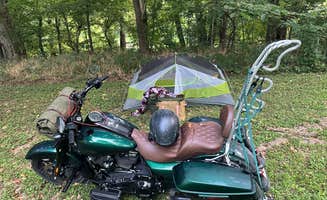Dispersed camping near Dixon, Missouri offers primitive overnight options on public lands where temperatures range from 26°F in winter to 89°F in summer. The area sits at approximately 800 feet elevation in the northern Ozarks, characterized by forested hills and limestone features. Camping regulations typically include 14-day stay limits and requirements to pack out all trash.
What to do
**Fishing access: 15-minute drive from Toronto Springs Dispersed to nearby creeks and rivers for smallmouth bass and sunfish. Toronto Springs Dispersed provides free parking for anglers, with one camper noting, "Completely free clean and shaded couldn't ask for better."
**Hiking trails: Multiple unmarked paths near Indian Trail Designated Campsites lead through oak-hickory forest with moderate elevation gain. Most trails range from 1-3 miles and require proper footwear due to rocky terrain.
**Wildlife viewing: Dawn and dusk offer prime wildlife spotting opportunities, particularly for white-tailed deer, wild turkeys, and numerous bird species. Spring and fall migrations bring additional bird diversity to the area.
What campers like
**Natural shade: The mature forest canopy at Toronto Springs provides natural cooling during hot summer months. Even during July and August when temperatures exceed 85°F, the dense tree cover maintains comfortable camping conditions.
**Quiet atmosphere: The lack of developed facilities means fewer crowds at these dispersed sites compared to nearby state parks. Weekdays typically see only 2-3 other camping parties across the entire area.
**Budget-friendly: No fees for camping at Indian Trail Designated Campsites makes this location appealing for cost-conscious campers. The free camping allows longer stays for those exploring the region on limited budgets.
What you should know
**Water availability: No potable water exists at either dispersed camping area. The nearest reliable water source is approximately 8 miles away in Dixon. Each person should bring 1 gallon of water per day.
**Road conditions: Access roads deteriorate significantly after rainfall, particularly at Toronto Springs where clay content creates slippery surfaces. High-clearance vehicles recommended during wet periods, and camping is most accessible May through October.
**Fire restrictions: While Toronto Springs permits campfires in established rings, Indian Trail prohibits all open flames year-round. Check current fire danger levels with the Mark Twain National Forest office before establishing any campfire.
Tips for camping with families
**Safety considerations: The lack of cell service at these dispersed sites requires advance planning. Families should bring basic first aid supplies and know the location of the nearest emergency services in Dixon, approximately 15 minutes away.
**Entertainment options: No playground equipment or developed recreation exists at these sites. Bring nature identification guides, magnifying glasses, and other exploration tools to engage children with the natural environment.
**Spacing considerations: Campsites at these dispersed areas lack defined boundaries. Arrive early (before 2 PM) on summer weekends to secure adequate space for family camping arrangements with appropriate distance from other campers.
Tips from RVers
**Size limitations: Most dispersed areas near Dixon accommodate smaller rigs under 25 feet. Larger RVs face significant challenges with road clearance and turnaround space, particularly at Toronto Springs where the access road narrows considerably after the first quarter mile.
**Leveling requirements: Bring adequate leveling blocks as most sites feature natural, ungraded surfaces with moderate slopes. Most campsites require 2-4 inches of leveling adjustment for comfortable overnight parking.
**Generator restrictions: Neither location permits generators during quiet hours (typically 10 PM to 7 AM). Solar setups provide the most reliable power solution for extended stays at these primitive locations.


